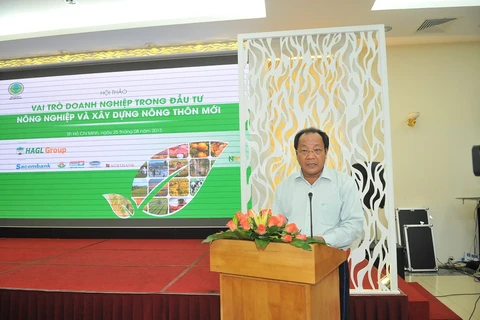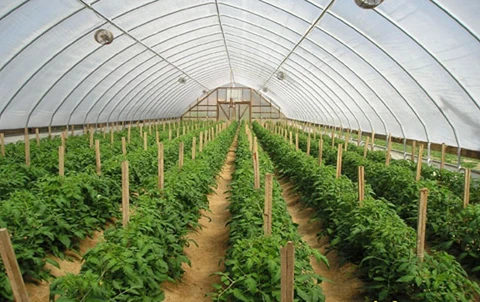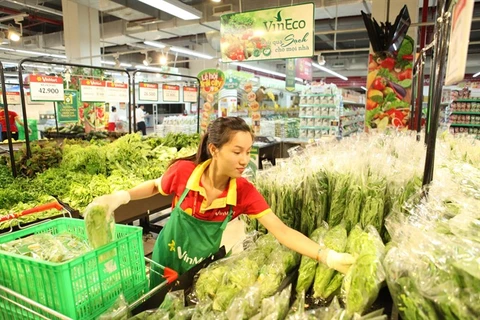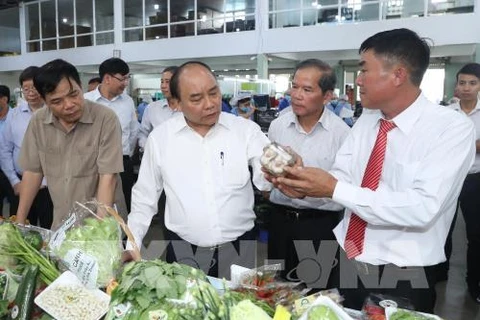Tien Giang (VNS/VNA) – The Mekong Delta province of Tien Giang has developed new agricultural production models that provide farmers with a reliable income to cope with climate change in its eastern districts and Go Cong town.
They include growing rice in the rainy season and breeding shrimp in the dry season in the same field. Others include growing vegetables, dragon fruit and other crops instead of rice.
Located downstream of the Tien River, a major tributary of the Mekong, the province is severely affected by saltwater intrusion in the eastern districts of Cho Gao, Go Cong Tay, Tan Phu Dong, and Go Cong Dong and Go Cong town.
They have total land of more than 101,000ha, or 40.4 percent of the province’s total, including 73,000ha of farmlands.
The districts, which are on or close to the coast, are normally affected by drought and saltwater intrusion for three to six months every year during the dry season.
In the past local farmers grew only rice and had modest incomes because of low yields in the dry season. With the encouragement of local authorities, in recent years they have begun to rotate rice with other crops or switch completely to fruits and other crops.
Pham Van Minh, who has a 3.5ha rice field in Tan Phu Dong district’s Phu Tan commune, said he has begun to alternate between rice in the rainy season and shrimp and crabs in the dry season.
He earns around 214 million VND (9,200 USD) a year now, twice the amount from just rice, he said.
Le Hong Dang of Tan Phu Dong’s Phu Dong commune has begun to grow red chilli and lemongrass instead of rice on his 1.1ha of land. Last year, he earned 60 million VND (2,570 USD) from them, he said.
Nguyen Van Hai, head of the Tan Phu Dong Agriculture and Rural Development Division, said farmers there successfully grow lemongrass in rice fields, establishing the province’s largest lemongrass growing area.
The district has more than 1,500ha under the crop and an annual output of 20,000 tonnes, he said.
More than 500ha of paddies in the district are also used to rotate between rice and shrimp, providing farmers with annual incomes of hundreds of million of VND per hectare, he said.
Tan Phu Dong has determined lemongrass is one of its key crops to adapt to climate change and provide steady incomes to farmers since it is easy to grow even in areas where saltwater intrudes.
Farmers said they could harvest 15 tonnes of lemongrass per hectare each year, earning 1-1.5 million VND per tonne.
In Go Cong Dong, many farmers are now using their paddies to grow vegetables and fruits to Vietnam good agricultural practices (VietGAP) standards.
In its Kieng Phuoc commune, 60 farmers grow red-flesh dragon fruit on 40ha and earn high incomes.
The commune has set up the Kieng Phuoc VietGAP Dragon Fruit Cooperative and plans to expand the area under dragon fruit to 250ha in areas contaminated by saltwater.
Cao Van Hoa, Deputy Director of the provincial Department of Agriculture and Rural Development, said in the eastern districts’ rice farmers have begun to rotate rice and another crop on nearly 15,000ha and grow other crops only on nearly 2,000ha of paddies in the last two years.
The districts have taught farmers new techniques to improve quality, he said.
Under the province’s plan to restructure agricultural production in eastern districts by 2025, which began two years ago, the districts will only plant two rice crops a year or rotate between rice and one other crop.
Tan Phu Dong district will switch to other crops that can tolerate saltwater. The district will grow high-value vegetables and other crops and expand the models of rotating between rice and fish or shrimp.
Pham Anh Tuan, Vice Chairman of the provincial People’s Committee, said the plan would cost more than 1.66 trillion VND (71.1 million USD).
“Climate change is a challenge and an opportunity for difficult areas like Go Cong to restructure and develop sustainably,” he said.-VNS/VNA
VNA

























